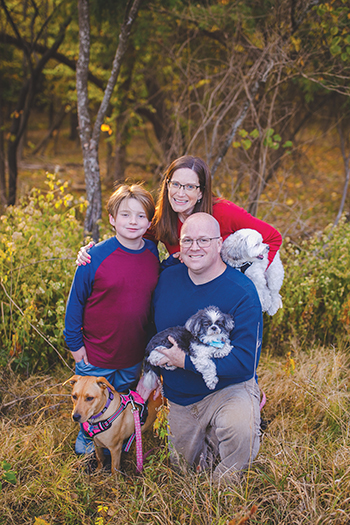HER2+ Breast Cancer Survivor
Stay focused on the positive

Jenny Marshall was diagnosed at 36 with Stage I ER-, PR-, HER2+ breast cancer, one of the least common subtypes and one that is particularly aggressive. The support from her husband was invaluable. And, she found strength from a mentor and friend she bonded with after meeting her at a breast cancer support group. Today, she is cancer-free and passionate about sharing the importance of connection and support every step of the way.
Both of my parents have had cancer. My mother had breast cancer and my father had 7 primary cancers, with the first diagnosed when I was just 3 years old. Because of this history, my OB/GYN ordered a baseline mammogram before I became pregnant with my son to make sure I had a clean bill of health. Everything looked good, and I was able to get pregnant and give birth to my son.
When he was about 2 and a half, I went to my primary care doctor to discuss having baby number 2. She suggested I have a quick mammogram. Even though I wanted to get back to work, there was no waiting, so I had it done. I could tell something was wrong by the look on the technician’s face. One week later I was called back for a biopsy. Six days later, I was diagnosed with Stage I ER-, PR-, HER2+ breast cancer.
There was some debate over the stage because my milk from breastfeeding my son had not completely dried up. It made it difficult to determine the exact size of the tumor on the imaging. But because this subtype was considered aggressive, they felt I needed to start treatment right away for the best outcome.
Due to my family history of cancer, I opted for a double mastectomy followed by chemotherapy and anti-HER2 targeted therapy. A couple of years after my diagnosis, I had genetic testing that discovered a rare BRIP1 mutation that increases the risk for ovarian cancer. I had a full hysterectomy to avoid the risk of ovarian cancer.
From the day I received my diagnosis, my husband and I knew we would need help getting through this. I’d been sent home with a bag of goodies and pamphlets. That night we went through everything. I found information about a local Gilda’s Club, which offers a wide range of support for families facing cancer. They even have support for children, which was great because our son was only 2 and a half and we wanted help in explaining everything to him.
I contacted them the next day and we were invited to the next orientation meeting. I joined the survivor group, and my husband joined the caregiver group. We were pleasantly surprised to learn that Gilda’s Club offered books to educate children about cancer and even provided a child psychologist.
That support came in handy because one day my son came home from day care and said the other kids wanted to know why his mommy didn’t have hair. It had fallen out during chemotherapy. My support group offered to send books to my son’s day care to help his classmates learn about cancer and understand what was happening.
The people in the support groups became like our second family. I met Sara in my survivor support group, and she became a mentor and an emotional and psychological caregiver for me. She had Stage III breast cancer and understood what I was going through more than my husband. She became like a sister. I don’t know how I would have gotten through everything without her support.
Her energy was so inspiring. I’d had multiple complications over my journey, and she had as well. She provided a kind, compassionate listening ear and was always available when I needed emotional support. Even on the days I’d call, bawling my eyes out, she was there for me. That’s when she would tell me, “There is light at the end of this journey.”
During and after treatment I also took advantage of the psychological counseling offered through Gilda’s Club, and it’s helped me immensely.
I have some long-term side effects from the medication, such as neuropathy in my hands and feet. And, I feel that because of my family history, a future cancer is a matter of when, not if. So, I am vigilant about going to checkups and having follow-up testing. I also have regular checkups with my cardiologist to watch for any late effects on my heart from all the treatments.
I stay positive and have adopted a healthy lifestyle that includes being a member of the Kansas City Pink Warriors, the first full-time dragon boat team in Missouri and Kansas. It consists of female cancer survivors and thrivers, and they have become more supportive connections for me. I also volunteer as a public speaker at some Gilda’s Club events. I want to give back to an organization that helped me so much.
I encourage everyone to be their own best advocate. Know your body and when to get help. We all have bad days, but you can get through them. Even on the darkest days, remember that there is always light.


